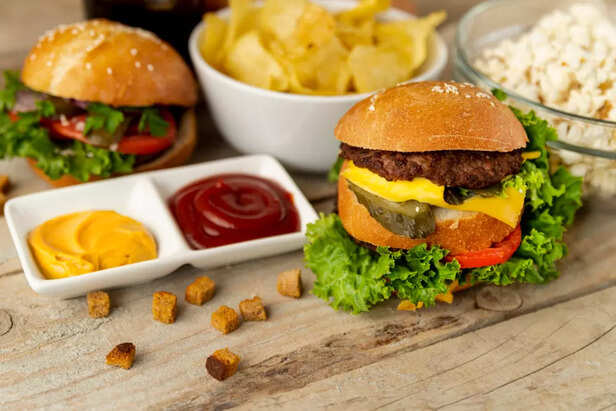Junk food is loved by all but considered bad for health by all

A group of friends enjoying junk food at restaurant
Temptations abound- cheesy pizza, crispy burgers, and chilled soft drinks. Truth be told, very few people can cut out junk food completely. The good news is that they don't have to! All you have to do is keep a few things in mind to savor your favorite snacks and still be healthy.
The Problem with Junk Food: Why Is It Unhealthy?

lots of junk food
Extremely high in calories and low in nutrients and fiber, junk food is believed to be bad for our health. Take a look at the dire statistics: According to a study conducted by the WHO, junk foods and processed foods are acknowledged contributors to obesity, heart disease, and diabetes. According to 2023 CDC reports, almost 36% of adult Americans consume fast food daily, while in India the figures are increasing with urban youth averaging 3-4 fast food consumption per week. According to research conducted at the Harvard School of Public Health, eating fast food two or more times a week increases the chance of developing type 2 diabetes by 27%. The risk factors notwithstanding, these forms of foods are now part and parcel of most modern-day diet styles. One key word: moderation; probably another- be smart with your choice!
Junk food remains an integral part of modern diets. The key is moderation and making smarter choices.

society forces to eat junk food
1. Portion Control: The Golden Rule
One of the biggest reasons junk food is harmful is overeating. When you order a large pizza, it’s easy to eat 3-4 slices in one go, consuming over 1,200 calories—which is nearly 60% of the daily calorie requirement for an average adult!
How to Control Portions Without Feeling Deprived
- Instead of ordering a large burger, go for a regular or junior size. Share your fries or desserts with a friend instead of eating them alone. Use smaller plates—it’s a psychological trick that makes your portion look bigger. Eat slowly. It takes about 20 minutes for your brain to register fullness, so don’t rush. A 2019 study published in the American Journal of Clinical Nutrition found that people who ate mindfully (chewing slowly, savoring flavors) consumed 30% fewer calories than those who ate quickly.
2. Make Smart Swaps: Small Changes, Big Impact

Friends, fun, and junk food.
Instead of cutting out junk food completely, try healthier alternatives that taste great but have fewer negative effects.
Some Easy and Effective Swaps-
Even small swaps can reduce calorie intake by 200-400 calories per meal, which can add up over time.
3. Balance It Out: Pair Junk Food with Healthy Foods

balanced food
eating junk food, pair it with nutrient-dense foods to balance your diet. For example: If you’re having pizza, add a side of salad or grilled vegetables. If you’re eating a burger, go for a whole wheat bun and add extra lettuce and tomatoes. If you crave chips, pair them with hummus or Greek yogurt dip instead of a high-fat dip.
According to a 2021 study from the Journal of Nutrition, people who balanced processed foods with fiber-rich foods had lower blood sugar spikes and less weight gain compared to those who only ate junk food.
4. Stay Active: Burn What You Eat

Burger
No matter how well you control portions or make smart swaps, physical activity is essential. If you consume junk food, you need to burn off the extra calories to prevent weight gain and metabolic issues.
How Much Exercise Do You Need?
According to the American Heart Association (AHA): Adults should get 150 minutes of moderate exercise or 75 minutes of intense exercise per week. 30 minutes of brisk walking can burn around 200 calories, which is equivalent to a small bag of chips. Even simple activities like taking the stairs instead of the elevator or walking instead of driving can help maintain a calorie balance.
5. Hydrate Wisely: Avoid Sugary Drinks

Added sugar drink
Soft drinks and sodas are one of the biggest sources of empty calories. A 500ml bottle of soda contains around 55g of sugar—more than the daily recommended limit of 50g by the WHO.
Healthier Drink Options
Infused water (add lemon, cucumber, or mint for flavor)
Unsweetened iced tea or black coffee
Fresh fruit juices (without added sugar)
Coconut water.
According to a 2022 study in The Lancet, people who replaced soft drinks with water lost an average of 2-3 kg in six months without changing their diet.
7. Limit Late-Night Junk Food-

man sleeping on couch after eating junk food
Eating junk food late at night can cause:
Slower digestion (your metabolism slows down at night).
Weight gain (extra calories get stored as fat).
Poor sleep quality (due to high sugar and fat content).
A 2018 study published in Obesity Journal found that people who ate junk food at night had a 50% higher chance of obesity than those who ate it during the day. If you crave something late at night, opt for:
A handful of nuts (almonds, walnuts, or pistachios).
A small bowl of Greek yogurt.
Dark chocolate (at least 70% cocoa).
8. Plan Your Cheat Meals

cheatmeal
Instead of eating junk food randomly, plan your indulgences. For example:
If you’re going out with friends on Saturday, keep your diet clean on other days.
Enjoy one cheat meal per week, not a whole cheat day.
A 2019 study from the International Journal of Obesity found that people who planned cheat meals were more likely to stick to their diet and experienced less guilt compared to those who binged impulsively.
Final Thoughts: Enjoy Junk Food the Smart Way

A sweet couple enjoying the junk food
Eating junk food isn’t the problem—excessive consumption is. By practicing portion control, making smart swaps, balancing meals, staying active, and hydrating properly, you can enjoy your favorite treats without harming your health. Remember: It’s about balance, not restriction. If you love junk food, there’s no need to quit—just learn to manage it wisely!
So, next time you crave a burger or a pizza, go ahead—just pair it with some healthy habits!











